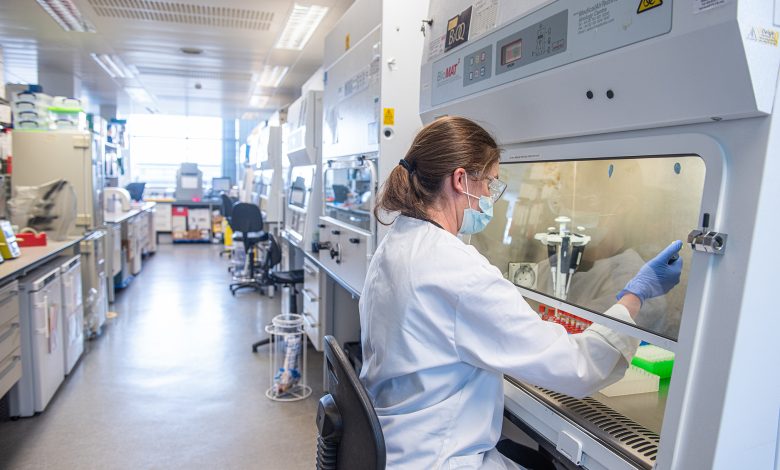
جامعة أوكسفورد تطور لقاحا فعالا ضد مرض الملاريا
PA
London: Researchers in Britain have developed the world’s most effective malaria vaccine, with it becoming the first to achieve the World Health Organisation-specified 75% efficacy goal.
Researchers from the University of Oxford and their partners have reported findings from a Phase IIb trial of a candidate malaria vaccine, R21/Matrix-M, which demonstrated 77% efficacy over 12 months of follow-up.
They hope the vaccine can be approved for use within the next two years, building on the speed and lessons learned through the rapid development of Covid-19 jabs.
Adrian Hill, who is director of the Jenner Institute, and Lakshmi Mittal and Family Professor of Vaccinology at the University of Oxford, also led the research behind the Oxford/AstraZeneca coronavirus vaccine.
As co-author of the paper, he said: “With the commitment by our commercial partner, the Serum Institute of India, to manufacture at least 200 million doses annually in the coming years, the vaccine has the potential to have a major public health impact if licensure is achieved.”
Asked how confident he was that the efficacy could be replicated in the next phase of the trial, Prof Hill told the PA news agency the researchers were “pretty confident”.
He added: “And we and others have found that if you vaccinate just before the malaria season, you get maybe a 10% improvement or something like that in efficacy – that’s not published yet but will be coming out fairly soon from another group.”
When asked if this was the most effective malaria vaccine in the world, Prof Hill said: “It is in the sense that no other vaccine has had a primary endpoint with over 75% efficacy, yes.
“So we’re excited about that. But as you know, there’s a final phase of testing to go through.”
Prof Hill said researchers hoped to report the results of the final stage of the trial next year.
He told PA: “Malaria killed at least four times as many more people in Africa last year as Covid did.
“And nobody for a moment questioned whether Covid should have an emergency use review and authorisation in Africa – of course it did, very quickly.
“So why shouldn’t a disease that firstly kills children rather than older people, certainly killed an awful lot more, be prioritised for emergency use authorisation in Africa?
“Nobody’s really ever asked that question before Covid, but we’re going to do so, and have been doing so, and regulators are sounding interested.
“Normally this would take three to five years to do a phase three trial – in that time 300,000 children in Africa will die every year of malaria.
“Why should it take that long?
“We think that there is a similar case for deploying malaria vaccines early to save lives, that there is for deploying Covid vaccines.”
The first scientific report for a malaria vaccine was published in 1910, the first trial of a malaria vaccine took place in the 1940s, and 140 malaria vaccines have gone into clinical testing.
Prof Hill said there had been no shortage of effort, but it had just been incredibly difficult.
He was in the room when the World Health Organisation (WHO) set the target of 75%, and suggested the percentage when there was discussion on what number to settle on.
Prof Hill said: “They gave a target and the WHO is famous for giving targets that would be, to be polite, aspirational.
“This one was 75% efficacy by 2030. Here we are in 2021 aiming for licensure in two years.
“So for once we might get there, well before the target, which would be very, very good.”
He told PA: “I’ve been working on malaria vaccines since 1994 – it is not 111 years but sometimes it feels a bit like that.
“This is great, fantastic. We saw the first look at these results after six months last year and we were, we were thrilled.
“This is a great day – we need to build on this, we need to keep all our ducks in a row, we need to avoid any safety signal, but I think the odds are now on our side, we can get this through.”
Professor Charlemagne Ouedraogo, minister of health in Burkina Faso, said: “Malaria is one of the leading causes of childhood mortality in Africa.
“We have been supporting trials of a range of new vaccine candidates in Burkina Faso and these new data show that licensure of a very useful new malaria vaccine could well happen in the coming years.
“That would be an extremely important new tool for controlling malaria and saving many lives.”
The randomised, controlled, double-blind trial was conducted at the Clinical Research Unit of Nanoro/Institut de Recherche en Sciences de la Sante, Burkina Faso.
There were 450 participants, aged five to 17 months, who were split into three groups, with the first two groups receiving either a low dose or a high dose of the vaccine candidate.
The third group received a rabies vaccination as the control group.
Doses were administered from early May 2019 to early August 2019, largely prior to the peak malaria season.
The study, published on SSRN/Preprints with The Lancet, reports a vaccine efficacy of 77% in the higher-dose adjuvant group, and 71% in the lower-dose adjuvant group, over 12 months of follow-up.
Researchers did not note any serious adverse events related to the vaccine.
قنا
لندن: أعلن فريق من الباحثين بجامعة /أوكسفورد/ البريطانية عن تطوير لقاح مضاد لمرض الملاريا بلغت درجة فعاليته 77 بالمئة في التجارب الأولية، ما قد يمثل قفزة في مكافحة المرض.
وأجرى فريق الباحثين تجارب اللقاح على 450 طفلا في بوركينا فاسو، وأثبت درجة عالية من الأمان والفعالية على مدار 12 شهرا من المتابعة.
ومن المقرر أن تجري المرحلة التالية من التجارب على اللقاح على نحو 5000 طفل تتراوح أعمارهم بين خمسة أشهر وثلاثة أعوام في أربع دول أفريقية، بهدف التأكد من نتائج التجارب الأولية.
وقال البروفيسور أدريان هيل، مدير معهد /جينر/ بجامعة أوكسفورد، إن “اللقاح يعد الأول الذي يفي بمعايير منظمة الصحة العالمية التي تتطلب نسبة 75 بالمئة فعالية على الأقل، في حين أن أكثر اللقاحات فعالية ضد المرض لا تتجاوز درجة فعاليتها 55 بالمئة”.
وأضاف أن “التجارب على هذا اللقاح بدأت في عام 2019 قبل ظهور فيروس /كورونا/ بوقت طويل، وأن فريق الباحثين بجامعة أوكسفورد الذي عمل على تطوير لقاح /أوكسفورد-استرازينيكا/ ضد مرض /كوفيد-19/ استفاد في تجاربه من التجارب التي أجريت على اللقاح ضد الملاريا”.
ورغم إجراء تجارب كثيرة على تطوير لقاحات مضادة للملاريا على مدار السنوات الماضية، إلا أن هذا اللقاح يعد الأول الذي أثبت فعالية عالية ضد المرض، وقد يصبح له تأثير كبير على مكافحة المرض.
وتكمن صعوبة التوصل إلى لقاح على درجة عالية من الفعالية ضد مرض الملاريا إلى أن هناك آلاف الجينات في /الملاريا، مقارنة بعشرات الجينات فقط في فيروس /كورونا/، الأمر الذي يتطلب درجة مناعة عالية جدا في الجسم لمقاومة المرض. وتبدأ أعراض المرض بالحمى والصداع والقشعريرة، ودون علاج قد تتطور إلى أعراض شديدة قد تفضي إلى الوفاة.
يذكر أن مرض الملاريا تسببه الطفيليات التي تنتقل إلى البشر عن طريق البعوض، ويتسبب المرض في وفاة نحو 400 ألف شخص سنويا على مستوى العالم، معظمهم من الأطفال في منطقة الصحراء الكبرى الأفريقية.
ووفقا لإحصاءات منظمة الصحة العالمية فإن الملاريا منتشر في 87 دولة، وفي عام 2019 قدر عدد الاصابات بالملاريا بنحو 229 مليون حالة، وهو رقم ظل عند المستوى نفسه خلال السنوات الأربع الماضية، وتحدث أكثر من 90 في المئة من وفيات الملاريا في إفريقيا، ومعظمها بين الأطفال الصغار.



